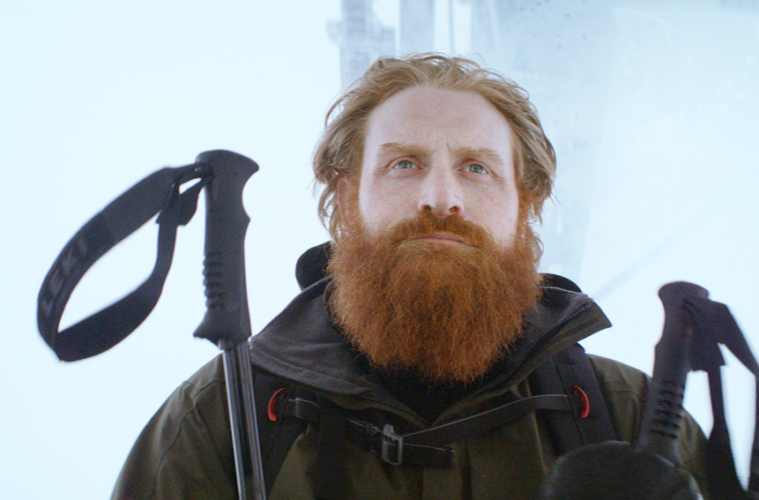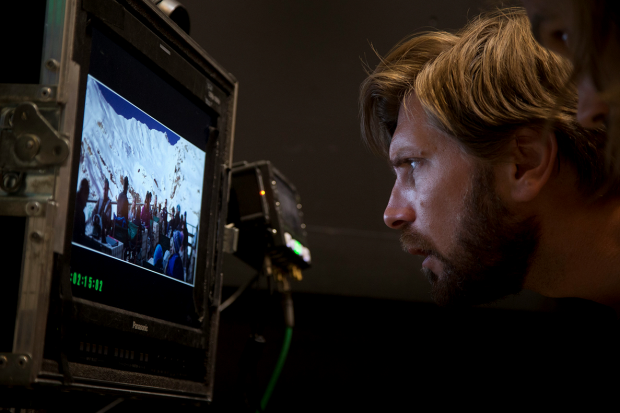
With only four feature films under his belt — including one of 2014’s most acclaimed films, Force Majeure, newly available to stream — Sweden’s Ruben Östlund is already the subject of a retrospective entitled “In Case of No Emergency” that’s currently starting its run through North America (details here). He recently took the time to talk with us about his willingness to be a provocateur, his beginnings in ski films and the controversy of his 2011 film Play, and more. Check out the full conversation below.
The Film Stage: Your first feature The Guitar Mongoloid was shot over a course of years?
Ruben Östlund: Yes.
Did you feel your ideas gradually changing over the course of production?
It was my first feature film that I made after film school. I started it immediately when I graduated. You know when you’re a young filmmaker and you want to get attention, well someone told me that when you’re making a film it’s like a duel; someone is pointing a gun towards the audience. I think that it was Nietzsche who said this from the beginning, and that’s the approach that I wanted with The Guitar Mongoloid. I wanted to make a film where the audience would have a problem; they should feel insecure with my intentions with the film, they should feel insecure if it’s a fiction or if it’s a documentary. I think that I had been tired of the way they had been portraying people that are a little bit odd when it comes to film history; like if someone had down syndrome then Sean Penn or something should play that character, like we always put a filter between us and the screen when we watched a depiction. I wanted to give people we didn’t often see onscreen get access to that room. It was a bit of a provocation.
But I guess when I was making The Guitar Mongoloid, I also realized that I was very interested in human behavior from a sociological aspect, and it led me straight to making Involuntary, that I think is a very thematic film about individuals versus the group or herd, and trying to highlight different aspects of that.
Your ski films Free Radicals (view here) are included in the New York part of the retrospective. Do you look back at them fondly or do you feel they’re not really representational of you as a filmmaker?
I’m the kind of person that loves all my films, even if they have errors and aren’t done 100% the way I would do them today, but I feel proud of them. The ski films were the starting point for me to become a filmmaker, because I’ve never been a cinephile. I’ve never been very interested in film history. I was interested in the video camera and what you could do with it. I was a really dedicated skier when I was between 20 and 25, and to film skiing was a way for me to be able to pay my rent and be away all the winters in different ski resorts. What I like about that period is that you are totally focused on what’s going on in front of the camera, and you’re really interested in what’s going on in front of the camera. A lot of people in the film industry can be — how do you say it — have romantic dreams of just being in the film industry and you’re more interested in being in the film industry than what you’re pointing the camera at. So I think that’s a good start when you are going to be a filmmaker; think of what are you really interested in filming and try to capture that in the best possible way, because we were working really really hard with those movies. I mean it took one year to make a ski film that was 30 minutes long, and I think we had a shooting period of 100 days. When I started in film school I got to know that when you shoot a feature film you have around only 30 days. But the kind of stamina that I have built up during the years of shooting skiing was something that I could use when I started to do feature films.
I actually kind of envision the ski films as something the family in Force Majeure would see.
For me when I left the ski world and I left all my friends. I was accepted for film school and I changed all my time for filmmaking, or a different kind of filmmaking. And since then I’ve been looking for a way to get back to the ski resort as an environment to use for a feature film, but it has been quite hard because the ski world is such a kitschy world; everybody’s dressed in neon colors, they’re well-to-do people, they have those lenses on their faces. It’s hard to find something existential about that kind of environment and raise questions about our life. But when the avalanche came up and just the set-up of the father abandoning his wife and his kids, it started to raise questions about gender expectations and so on. So suddenly I had the opportunity to use the ski resort as the set-up for a feature film.
At any point did you consider making another film like Guitar Mongoloid and Involuntary and have Force Majeure be one story within it?
Yes, in the beginning. In Sweden the name of the film is Turist, and in the beginning I thought of having three tourist situations, where the idea was to see rich Swedes lose their dignity [laughs] and have a kind of satiric attack on a certain kind of upper middle class lifestyle and the kind of mechanism those kinds of people have to confront when they were tourists. But when the part in the ski resort developed, and we found the idea about the avalanche, immediately I understood what this film should be about; it shouldn’t be a multiple-story film.
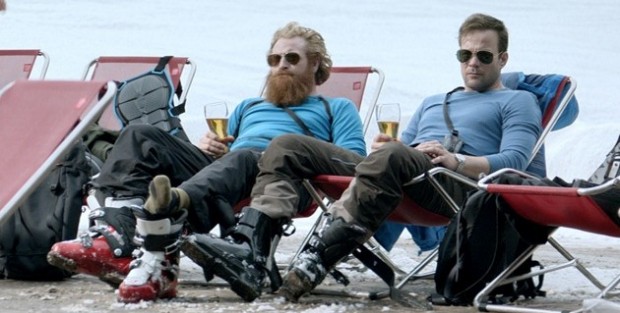
I know Play was massively controversial in Sweden. How different was the reaction when you took the film abroad on the festival circuit?
I can say that in Sweden and France it was quite controversial. In France these kind of topics are hard to approach because we want to push them aside and not talk about them at all. In Sweden there was this huge debate in the media where I was accused of being a racist. Questions I had to answer in France during the Cannes Film Festival in 2011 like, “Why do you hate black people so much?” You could tell there was something about that topic that they had a really hard time to handle. But when I was at the New York Film Festival for the screening of Play, the reaction was for the first time where an audience was comparable with my thoughts on the topic because I looked at it in the same way that I looked at Force Majeure or the other films: as a dark comedy or satire. People were laughing a lot; you could tell that there was dealing with stereotypes and class issues when it comes to black people. So yes, I definitely think the reaction for Play was best when it was at the New York Film Festival.
I interpreted the argument between the father and the witness at the end of Play as you can understand both sides of the argument but ultimately they both seem to be acting sanctimoniously; both taking moral high ground by making assumptions about the thieving kid. Is that how you intended it?
I think I tried to highlight it from a Scandinavian perspective. They are individuals who meet the problem and for me the father’s reaction is quite understandable. His son has been robbed by the robbers, and it caused quite a psychologically hard time for the victims; one didn’t want to go to school, another didn’t want to go to the city by themselves. But what I think is quite important about that scene is the woman who approaches the man afterwards, because she is standing for so many prejudices, and she is actually acting in the most racist way in the whole film. She’s making the black boy a victim just because of his skin color, and putting him into a context that she doesn’t know anything about. She thinks maybe he comes from a country where there’s a lot of war and blah blah blah, which is really the case for black people in Sweden more than in the U.S. of course. It was like a reverse-racism where you’re doing it because you want to do well, but you’re doing something where you’re not aware at all what your actions are causing.
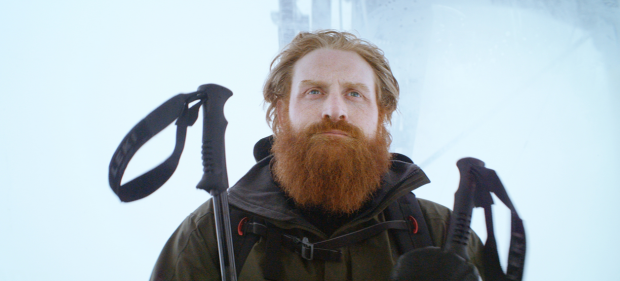
Force Majeure takes your films out of an urban space; are you interested in returning to a city like Gothenburg or exploring other countries and landscapes?
It all has to do with the topic of the film. I guess. What I’m dealing with now is a project called The Square, which is about a change of attitude when it comes to European society, but also U.S. society. We are taking less and less responsibility for what we have in common; an example of that I think is to build gated communities. In Sweden, for example, they have started to build gated communities since 2008, and a gated community is an extreme example of saying we only care about what’s going on in the inside of the gates and we don’t take care of what goes on outside of the gates. There’s a change when it comes to the old social democratic society of Sweden where we put a lot of trust in the state, they should help us, have solidarity with each other when it comes to public spaces or society in general. Today you can tell that we tend to be more scared of each other. We are thinking more about how can I help myself rather than how can I help my fellow citizen. I’m looking for the best set-up for that kind of content. I’ve been thinking about Swedish society a lot of course but when I was in L.A. I thought that it had a kind of — how do you say it — integration is not very good. The set-up of that topic could be very interesting. So maybe if I’m doing an English-language film, the U.S. is definitely a possibility for me thinking of a set-up for the next topic.
Between the reception to your latest film and Roy Andersson’s newest winning the Golden Lion at Venice, Swedish cinema had a great year. Are you optimistic about the state of Swedish cinema or are you feeling more attracted to the idea of doing co-productions?
I feel very excited about Swedish cinema because I think there is a certain attitude when it comes to the films that we are making today. In previous years there was a film called The Reunion, I don’t know if you’ve heard of it, but it was an artist that made a film that had a quite different approach to filmmaking. And I think there are a lot of filmmakers that are influenced by that way of making films today, so less conventional films I think there are quite many of them in Sweden, and I think they are trying to approach filmmaking from a more contemporary perspective. I mean I am very interested in YouTube, and when I make all my films I always look at YouTube and what kind of references can I find. I think the most interesting moving images of our time is not in the cinema anymore, and if we want to change that trend — to actually show the audience that we are capable or presenting very important moving images — then we have to adapt to adapt to more contemporary times and the digital era. And I think there is a movement in Sweden that is moving in that direction.
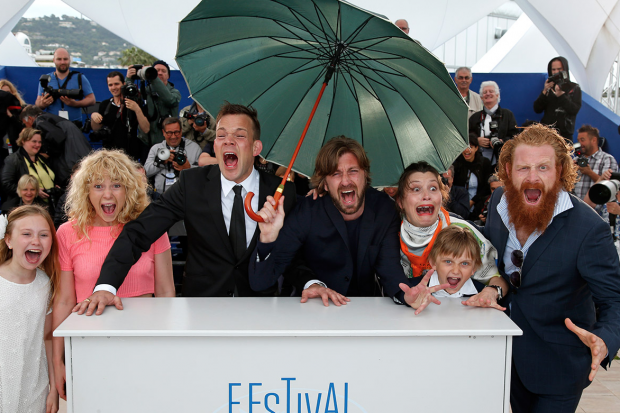
The films of Ruben Östlund are currently touring the country. See more details here.

